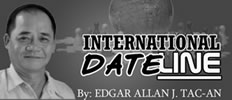VOLUME XXVIII No. 17 |
Tagbilaran City, Bohol, Philippines |
November 3, 2013 issue |
advertisement |
| - |
| - |
ARCHIVED ISSUES |
 |
 |
SYTEMATIC WORKS |
|
When a situation surprisingly threatens a person, a group of people, or an entire nation, and demands immediate decision making, it becomes a “crisis”. When the ordinary and usual circumstance can no longer be maintained and demands the need for change, a credible Crisis Management Plan is the answer. It is the prompt but short lived “first aid” type of response. It is a discipline of skills and techniques needed to assess, understand and cope with a serious situationfrom the start to the point of recovery. There are several types of crises, like natural disaster, technological crises, confrontation, malevolence and others. It is important to identify different types of crises for different crisis management strategies. Every nation specially the 3rd world countries like ours, besides poverty and disease, should give equal priority to the development of the system or program on the continuing training and preparedness of personnel division. It is indeed a great challenge to the organization and communication involved in responding to a crisis in a timely fashion. The credibility and reputation of the organization is marked by the perception of their responses during crisis situations. Potential global crises are enormous. Natural disaster as one, has risen in frequency to prompt the UN General Assembly to focus on all issues related to natural disaster reduction. Though it is impossible to control nature, the efforts and strategies adopted had somehow reduced the impact. This is a systematic work which involves different regions, different professions, and different scientific fields. Tragedies if anything, could serve as a sharp reminder that life is fleeting, nothing in this world really lasts forever save. Tidbits: Eschara v. Leonis Navigation Co., Inc., G.R. No. 182740, July 5, 2010 (Courtesy of Atty. Fidel Borja) AIDS is not listed as an occupational disease both under the POEA-SEC and the ECC Rules. Thus, the claimant bears the burden of reasonably proving the relationship between the work of the deceased and AIDS, or that the risk of contracting AIDS was increased by the working conditions of the deceased. In the present case, we do not find Eduardo’s AIDS to have been work-related. |
| - |
| - |
The Bohol Sunday Post, copyright 2006 - 2013, All Rights Reserved |
For comments & sugestions please email: webmaster@discoverbohol.com |



